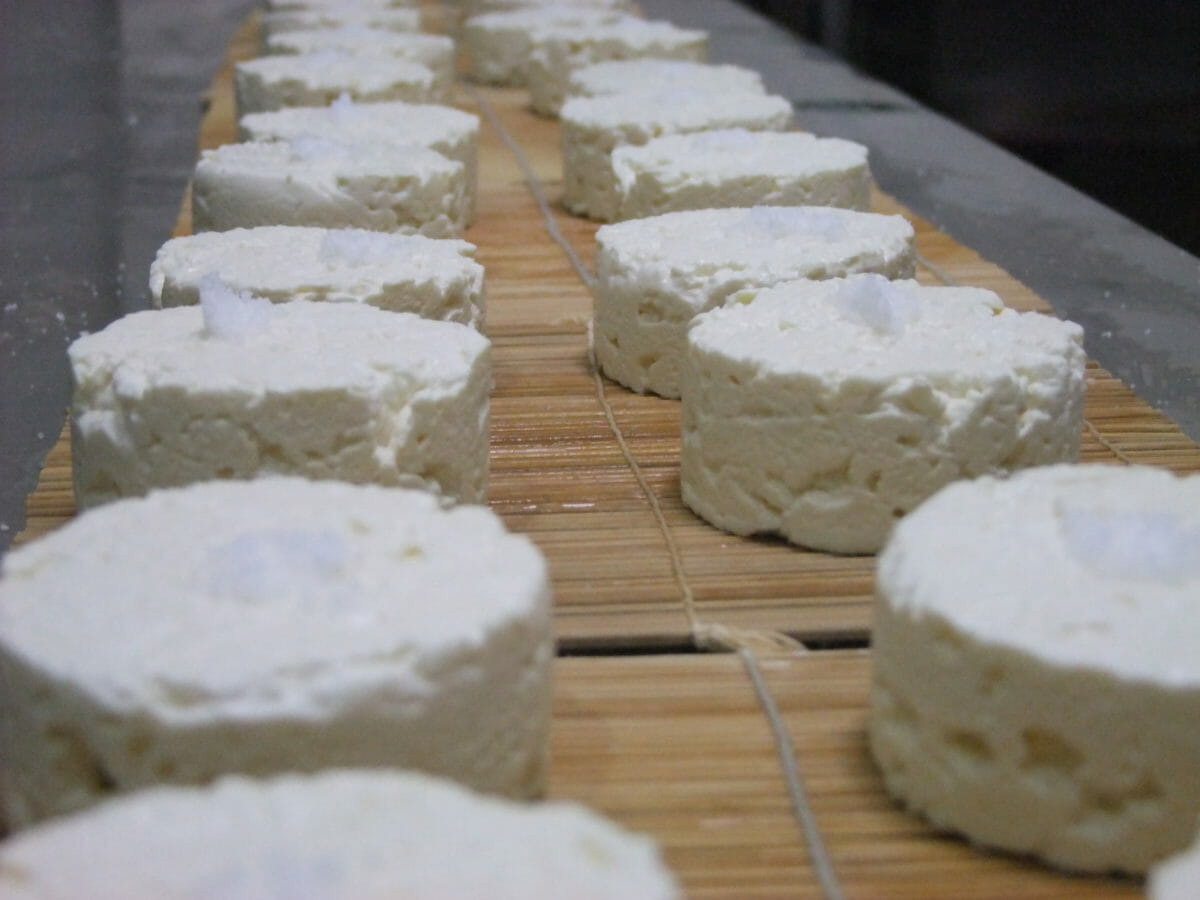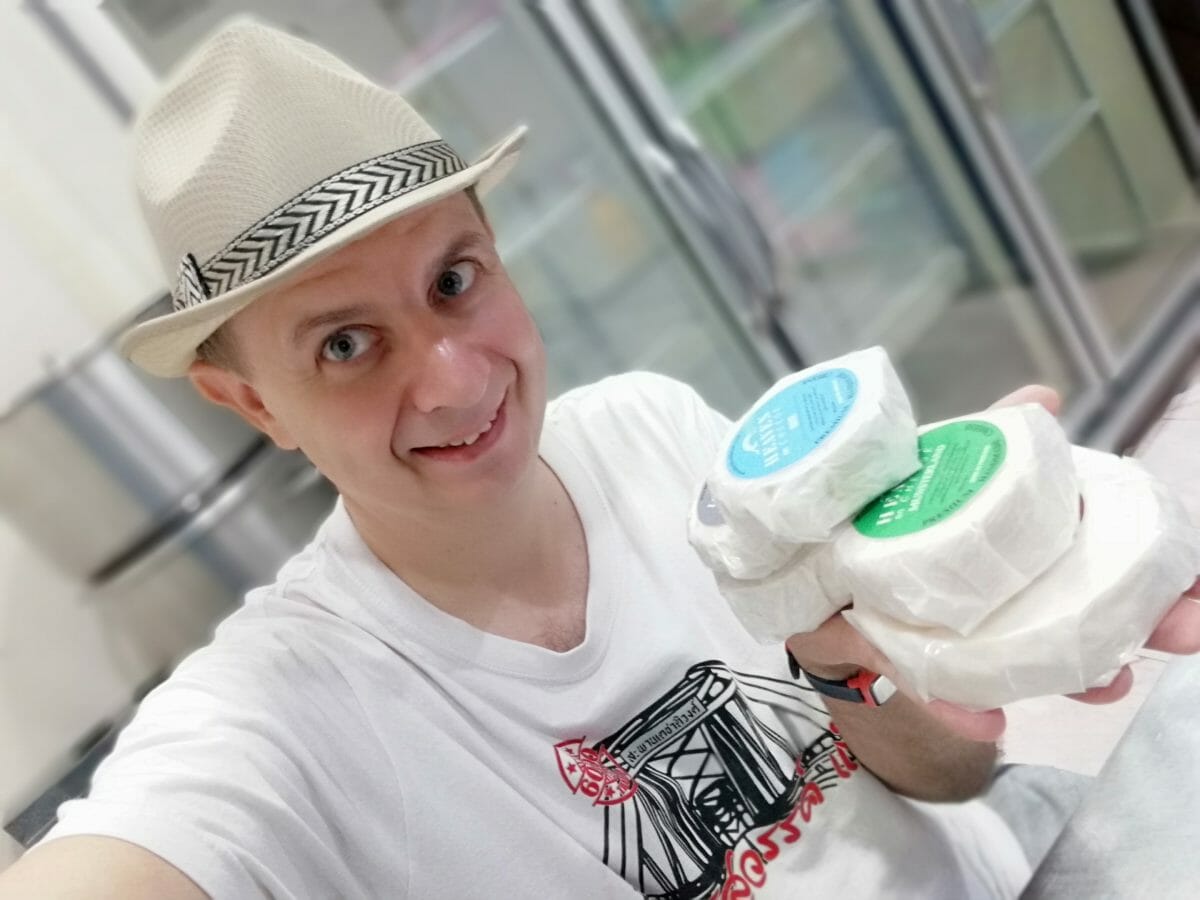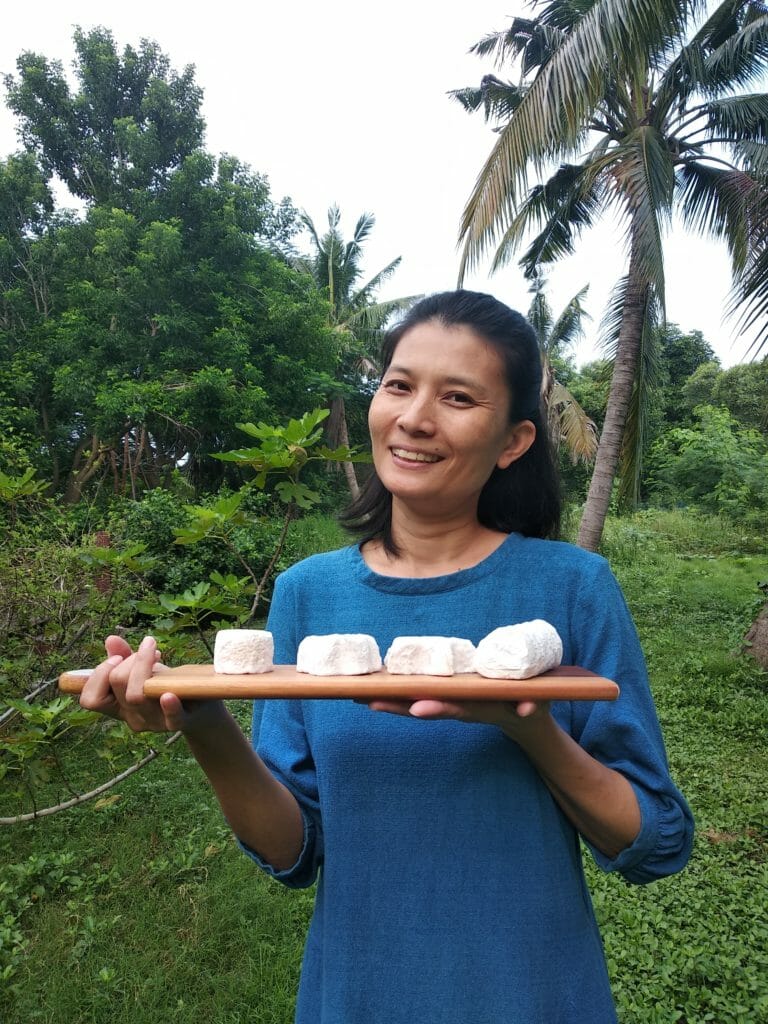Tai Chi? No, Thai Cheese
Meet the new crop of whey cool culinary artisans in central Thailand.
Tai Chi? No, Thai Cheese
Meet the new crop of whey cool culinary artisans in central Thailand.

There is a small but growing number of cheese producers in Thailand, a country not known for its cheese.courtesy Heaven on Cheese
Around 65 percent of the global population has a decreased ability to digest lactose after infancy; among those of East Asian descent, that number hovers somewhere between 70 and 100 percent. With those bleak figures, fostering a dairy industry in a country like Thailand seems pretty risky.
But, it turns out, the cheese stands alone.
“Asians already eat pizza, burgers and fries with cheese,” says Reinhard Matheis, a cheesemaker based in Thailand. “Cheese only contains a little lactose, which goes out with the whey during production or aging.” Lactobacillus, the main culture used in making cheese, changes lactose to lactic acid, making everything from camembert to cheddar, well, easier to swallow.
Along with his wife Chanida Sitthikeson, Matheis is among a small but growing number of cheese producers in Thailand. Matheis started out as a confectioner and baker, first in his native Austria, then in South Africa and on five-star cruise ships. When he met his wife and relocated to Nakhon Sawan, about 160 miles north of Bangkok, he really missed the flavor of cheese. After getting his hands on some fresh local milk, he drew on his twenty-plus years of experience in food production and began making soft varieties. It started as a hobby, and after some trial and error, it turned into a business.
For the past decade, the duo’s company, Heaven on Cheese, has been making around 9,000 pounds per year, sold to locals, visitors and expats. Their cheeses are available at an artisanal market, as well as in Thai hotels and restaurants. The company’s signatures include a double-cream brie studded with fresh truffles and reblochon, a soft washed-rind and smear-ripened cheese, both made with local raw milk. Matheis says the availability of quality milk and a suitable climate for aging the cheese are his greatest logistical challenges. (Though cheese matures best in a high humid environment, which Thailand has in spades, it prefers moderate temperatures of 50 to 55 degrees, which can be tricky in the country’s tropical environment.)

Three years ago, Kai Srikong, a former veterinarian and PhD student, quit her doctoral studies, switched paths and launched a dairy farm and cheesery, Little Goat Farm, in Nakhon Pathom. She had completed a research product identifying a string of DNA unique to one breed of Thai goats that allowed their milk to be more suitable for cheesemaking. “One day, I realized my research result is nothing if it cannot be a product, and a product is nothing if it cannot go to market,” she says.
Her thirty goats produce twenty to thirty liters of milk daily, which are immediately turned into soft cheeses including Khok Phra brie and nourkai, a fourteen-day ripened variety Srikong created and calls a “summer angel” since it can’t be produced during the rainy season. She sells her cheeses to restaurants in Bangkok, hotels including the Marriott, online and in farmers’ markets. Srikong hones her skills by practising, smelling, tasting—and researching on Google. “I believe my hard work will return results to other farmers,” she says.

So keep an eye out on your next trip to Chiang Mai or Phuket: Sweet desserts you expect to see in Thailand like tub tim krob, nam kaeng sai and kaw krep just might be joined by a selection of farmhouse cheddar, halloumi and blue.
CORRECTION: A previous version of this article incorrectly stated that Srikong’s goats produce five to thirteen liters of milk daily. We apologize for the error.
Follow us
This work is licensed under a Creative Commons Attribution-NoDerivatives 4.0 International License.
Want to republish a Modern Farmer story?
We are happy for Modern Farmer stories to be shared, and encourage you to republish our articles for your audience. When doing so, we ask that you follow these guidelines:
Please credit us and our writers
For the author byline, please use “Author Name, Modern Farmer.” At the top of our stories, if on the web, please include this text and link: “This story was originally published by Modern Farmer.”
Please make sure to include a link back to either our home page or the article URL.
At the bottom of the story, please include the following text:
“Modern Farmer is a nonprofit initiative dedicated to raising awareness and catalyzing action at the intersection of food, agriculture, and society. Read more at <link>Modern Farmer</link>.”
Use our widget
We’d like to be able to track our stories, so we ask that if you republish our content, you do so using our widget (located on the left hand side of the article). The HTML code has a built-in tracker that tells us the data and domain where the story was published, as well as view counts.
Check the image requirements
It’s your responsibility to confirm you're licensed to republish images in our articles. Some images, such as those from commercial providers, don't allow their images to be republished without permission or payment. Copyright terms are generally listed in the image caption and attribution. You are welcome to omit our images or substitute with your own. Charts and interactive graphics follow the same rules.
Don’t change too much. Or, ask us first.
Articles must be republished in their entirety. It’s okay to change references to time (“today” to “yesterday”) or location (“Iowa City, IA” to “here”). But please keep everything else the same.
If you feel strongly that a more material edit needs to be made, get in touch with us at [email protected]. We’re happy to discuss it with the original author, but we must have prior approval for changes before publication.
Special cases
Extracts. You may run the first few lines or paragraphs of the article and then say: “Read the full article at Modern Farmer” with a link back to the original article.
Quotes. You may quote authors provided you include a link back to the article URL.
Translations. These require writer approval. To inquire about translation of a Modern Farmer article, contact us at [email protected]
Signed consent / copyright release forms. These are not required, provided you are following these guidelines.
Print. Articles can be republished in print under these same rules, with the exception that you do not need to include the links.
Tag us
When sharing the story on social media, please tag us using the following: - Twitter (@ModFarm) - Facebook (@ModernFarmerMedia) - Instagram (@modfarm)
Use our content respectfully
Modern Farmer is a nonprofit and as such we share our content for free and in good faith in order to reach new audiences. Respectfully,
No selling ads against our stories. It’s okay to put our stories on pages with ads.
Don’t republish our material wholesale, or automatically; you need to select stories to be republished individually.
You have no rights to sell, license, syndicate, or otherwise represent yourself as the authorized owner of our material to any third parties. This means that you cannot actively publish or submit our work for syndication to third party platforms or apps like Apple News or Google News. We understand that publishers cannot fully control when certain third parties automatically summarize or crawl content from publishers’ own sites.
Keep in touch
We want to hear from you if you love Modern Farmer content, have a collaboration idea, or anything else to share. As a nonprofit outlet, we work in service of our community and are always open to comments, feedback, and ideas. Contact us at [email protected].by Kelly Magyarics, Modern Farmer
November 10, 2019
Modern Farmer Weekly
Solutions Hub
Innovations, ideas and inspiration. Actionable solutions for a resilient food system.
ExploreExplore other topics
Share With Us
We want to hear from Modern Farmer readers who have thoughtful commentary, actionable solutions, or helpful ideas to share.
SubmitNecessary cookies are absolutely essential for the website to function properly. This category only includes cookies that ensures basic functionalities and security features of the website. These cookies do not store any personal information.
Any cookies that may not be particularly necessary for the website to function and are used specifically to collect user personal data via analytics, ads, other embedded contents are termed as non-necessary cookies.
Kai’s service is really bad, and highly NOT recommended. Maybe the cheese are ok, though expensive, but when she makes a msitake at selling the wrong cheese to someone, she does not take responsability and exchange. Make the client wait forever. Anyway, not the type of person nad business you want to promote and support!! remember, your money is your power.